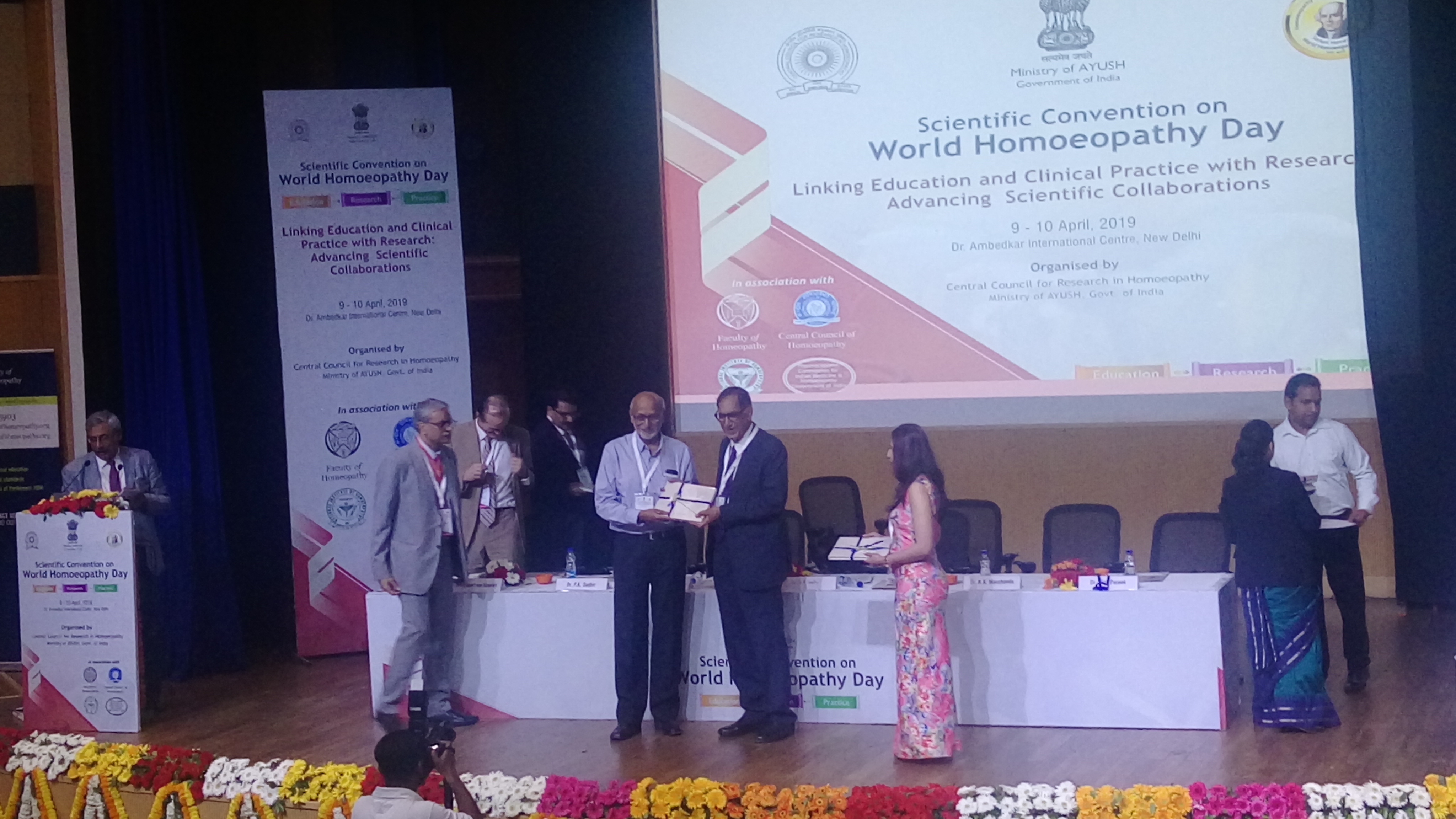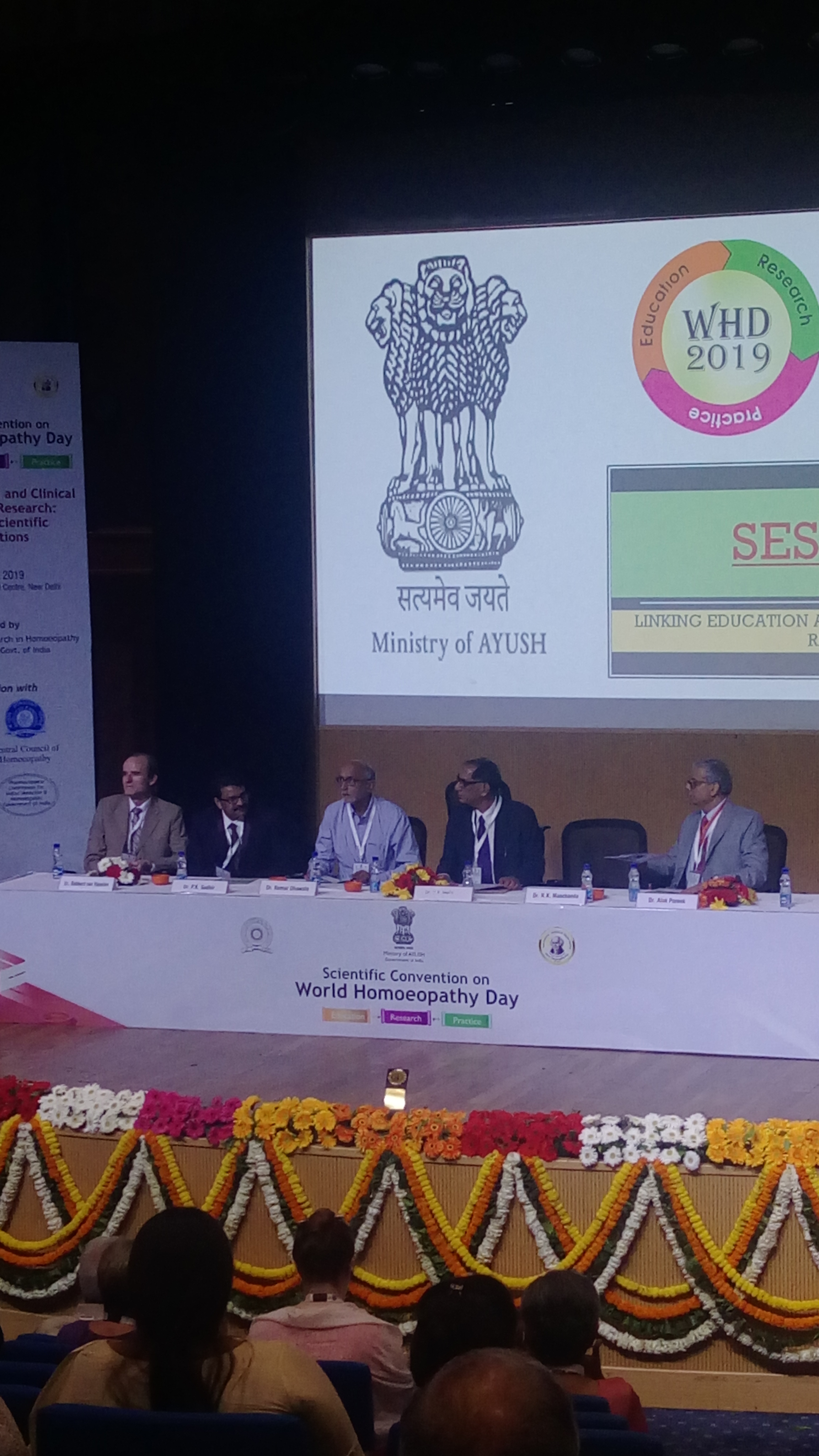THE ROLE OF THE MLDMHI IN THE SCIENTIFIC CONVENTION ON WORLD HOMOEOPATHY DAY: A REPORT
Dr Shraddha Shendre
PG Student, Dept. of Paediatrics,
Dr M. L. Dhawale Memorial Homoeopathic Institute, Palghar
Topic: Linking Education and Clinical Practice with Research
The Scientific Convention on World Homoeopathy Day was organized by the Central Council of Research in Homoeopathy (CCRH), New Delhi on 9th & 10th April 2019.
Objective:
Promotion of Scientific Research collaborations with various educational institutes and clinical practitioners across India.
Overall experience of the event:
Renowned practitioners across India and delegates from the U. K. had gathered for the Seminar; however, few students were present. All the speakers shared their experiences regarding the topic very well. The students and MD scholars were very enthusiastic; they presented very well and confidently. The presentation by Dr Neha Patel, an MLDMHI alumnus, was one of the finest of the day. There was a poster presentation in the Atrium, where posters were displayed on electronic screens and the presenters shared their research experiences. The majority of the presenters were from the Sarada Krishna Homoeopathic Medical College, Tamil Nadu, and they were significantly appreciated by the evaluators. I did feel that our students can do much better than many, due to our strong system using the Standardized Case Record and good clinical exposure with many patients. It was interesting to see that many Students had experimented to prove the efficacy of Homoeopathy on plants and animals with positive results. The inauguration ceremony was delayed slightly; moreover, simultaneous sessions were being held in all the 3 halls, making it difficult to attend all sessions. Thankfully, guided by Dr Prashant Tamboli and Dr Devangini, I could pick the best sessions.

The MLDMHI made some excellent presentations:
The first was on the topic “Bridging the gap between education and research: Possibilities and Difficulties” by Dr Kumar Dhawale. He stated that we need to improve the quality of Homoeopathic Institutions. His assessment was mainly based on 3 parameters, viz. Professional Practice, Teaching – Learning, and Research Publication. He gave an example of each. He also put forth the concepts of Clinical Integration in Education (Case-based lectures, early clinical exposure, problem-based learning, integrated seminars) and an integrated study of subjects (e.g., anatomy, physiology, community medicine) to cover all dimensions of learning. This will promote critical thinking in the students and they will start asking good questions, which can be converted into Research Projects with the help of experienced and trained faculty. Community linkage is important for evolution in the field of research. The challenges we commonly face are EBM (Evidence-Based Medicine) & Community relationship, Proper Documentation (unbiased), Motivating teachers for research, and the Regulations & lack of proper facilities in colleges. The 3rd parameter was Research Publication, and the Journal of Integrated Standardized Homoeopathy (JISH) was introduced in this context.
The second speaker from MLDMHI, Dr Prashant Tamboli, spoke on “UG & PG Curricula for enhancing research basis”. He explained how linking research to Homoeopathic education leads to long-term benefits, developing future researchers, and promoting a conducive environment for students interested in research. The junior research fellowship is an initiative in this direction. A structured curriculum helps in achieving these objectives. We do, we demonstrate how it is done, we know (knowledge): a proper path of learning, from action to knowledge through analysis!
The MLDMHI faculty and alumni were a part of the poster presentations at the event. Dr Devangini Broker presented a poster on “Need-Based analysis to develop a syllabus for the subject of research methodology and biostatistics for Postgraduate homoeopathy students’ Our alumnus Dr Swaroopanand Sarkar presented “Impact of Homoeopathic Intervention on changes in the emotional and behavioural expressions in children with mental retardation”. Dr Neha Patel presented a poster on “Psychosomatics of patients with essential hypertension and studying emerging homeopathic remedy profiles”.
My Response to the Theme of the Conference–
Until now, I knew dissertation to be the only research work. After attending this seminar, I came to know that if we want to and if we are supported by the institute and faculty, we can conduct research from our OPD / IPD / Community setup without much effort. All we need to do is to identify the gap from which the research question arises, gather evidence, and ensure proper documentation.
We follow our daily routines, but taking follow-ups in the OPD is part of the evaluation too. Proper Standardized Case Records and IPD documentation can help build proper records that can be used for further research.
Our Institution is well-planned & properly structured in the academic and clinical aspects. Unfortunately, I feel we are not aware of our assets. I felt that the conference theme was not new to me, it was based on what we do regularly. After this experience, we students are more conscious about the research-related significance of all the activities we conduct.
Learning
- The gap in the field of research is due to various barriers: psychological, practitioner and patient relationship, practical, and cultural. Moreover, there is a confirmation bias that exists in this field: confirming the existing beliefs and ignoring discomforting evidence.
I realized that we get training to overcome these barriers, especially using the Clinical Session Evaluation Form (CSEF).
- The concept of EBM in the context of Research, its significance – in conclusion, the importance of various tools and scales.
- The areas that need to be addressed are: Infrastructure of research in India and especially in our field of Homoeopathy, lack of trained researchers and faculty, awareness of research among students, improper documentation or lack of documentation, lack of conducive environment in the educational setup… we need to overcome these problems.
The Standardised Case record system: We have a strong system of record keeping, whicht should be used effectively.
- ‘Honest Researcher’- Dr Bindu Sharma coined this term while demonstrating her presentation, and I agree with her. We have faith in each other, so we should be honest in documenting and concluding our research results. They should not be merely for publication or bringing to any platform.
- The concept of “Problem-Based Learning”, the structured education system of our ICR system, was explained well by Dr Kumar Dhawale. The inquisitive physician is a potential researcher, and a well-structured education system can be the soil for a successful research outcome in the future.
- The concept of plagiarism: previously, knew that we have to give citations of articles / work by others, but was not aware that we should include citations of our own papers, if they have been published anywhere else.
- Salami Slicing: Amateur researchers often do this, fragmenting their research into small parts and publishing individual parts in different journals. This practice is highly unacceptable in today’s research environment.
- Importance of time while presenting – Dr Kumar Dhawale has addressed this in various events at MLDMHI. We should not underuse it or exceed it; however, the majority of speakers were not following this, I was observing Dr Dhawale when he was sitting as a chairman, continuously checking his watch and reminding other speakers about time. He himself followed this strictly in his presentations.
- Role of social media in Homoeopathy – effective use of social media to propagate research activities, small scale projects, etc. For example, case and poster presentations should be displayed on social platforms.
- Importance of Authentication – Patents, Copyrights, Trademarks.
- Many students have worked on showing the efficacy of Homeopathy in various disease conditions (in humans, plants, and animals) but the majority were lacking in proper reasoning. They could tell us about the What and Why, but were unable to articulate the How.

Difficulties
- I might not be that knowledgeable to express this, but when students were presenting the effect of Homoeopathic medicines on plants, I had my doubts. However, this is a new emerging field, so I realize that we have to be more open in terms of findings and results. It would be interesting to study how our dynamic medicines are actually showing results in the field of Botany.
- I was not able to attend many good sessions, as many sessions were going on simultaneously.
- Lack of Experience and Knowledge in this field led to difficulty in understanding many things.
Suggestions:
- Those who have an interest in the field should be given the chance to do research on a small scale in order to promote research practice. The dissertation is one such research, but it is too late for a student when he / she realizes its importance. Our research department is as good as any other department in the country, our students should be in the majority at such a platform.
- Students: We as PG students play a vital role in the field of research, as we are directly in contact with our patients and we are on the ground in community care activities. It is really important to give the best from our side. We need to change the mindset that we are helping the institute, we are helping ourselves in evolving from mere physicians to practitioners with excellence, who will contribute to our field not only at present, but also in future. Proper record-keeping and data collection should be done. Carelessness can result in false results; improper assessment or incomplete data can also influence the study.
Have an inquisitive mind, identify as many gaps as you can specific to the department, and don’t keep these to yourselves. Bring your findings to your head of department and the Research department, you never know. The next big research idea could come from you!
- We have highly qualified faculty in each department, small-scale research projects can be taken up under their guidance, where students can participate in group or as individual.
- We should have a Pharmacy Laboratory as well. Drug preparation and dynamization are the aspects that should be looked upon for future research.
- To make learning fun, there should be an Institution-level competition in Multi-faceted activities like Case Presentations, Poster Presentations, Debates, and Extempore speeches.
The overwhelming feeling I came away with when I attended these sessions was that I felt proud of being part of this institute. That is why it was an honour to hear from others about our institution and how they respect our work.
[/vc_column_text][/vc_column][/vc_row]






